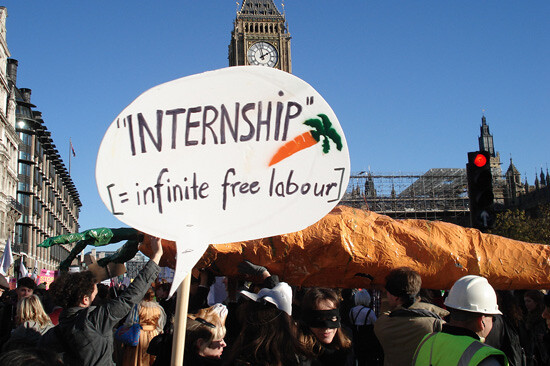The week of November 10, characterized now by the dramatic occupation of Millbank and described as “the event of the generation of debt, precarity, and unemployment,” brought 50,000 people into the streets of London.1 Entering the halls of Britain’s Conservative Party headquarters, many of us found ourselves overwhelmed by a movement we did not know existed. Formerly tucked in the folds of student unions, further education colleges, local councils, trade unions, and classrooms, a mobilization that seemed almost unthinkable only the week before materialized before our eyes. At once beautiful and perplexing for many of us involved in the formerly benign feeling of London’s cultural scene, was to see how quickly so many of us—artists, lecturers, students of fashion, design, music, and theatre—shed years of a neoliberal lockdown on the arts to re-conjugate ourselves as active political agents.
What can only be described as an ideological attack on the poor, on arts and humanities—on critical thought and production and on what little remains of the British welfare state—threw Britain into a state of crisis. In response, we demanded free education for all, for cultural assets to be managed through democratic processes, for decisions about the future of culture and education to stay out of the hands of non-elected “advisors” (such as Lord Browne, former Chief Executive of British Petroleum and current Chair of Trustees of the Tate Gallery). We also shouted that our resistance to the current cuts is not a call for the restoration of New Labour’s public-private confusion, but something else: the articulation of a cultural and political commons. Finally, we demanded an end to police violence and showed solidarity with those who have been arrested, and against those who have suspended our right to be in the streets.
In the frenzied chronicling of this autumn of discontent, and of a movement with no end in sight, it is impossible to analyze from outside, to make reviews or predictions about “them”—the students, artists, or activists. With the force of life that has moved us from art school to art school, from campus to campus, from meeting to meeting, those regimes of spectatorship, observation, and aesthetic judgment (in all their contemporary pseudo-critical wrappings) that felt so impenetrable before, suddenly seem anachronistic in the context here and now.
We therefore write our recount in fragments, moments, and movements from the multiplicity and power of these recent events that we do not yet know how to name. Names will surely come, but there is also tremendous happiness in the semioclasm of the early days and nights of a movement at its beginning.
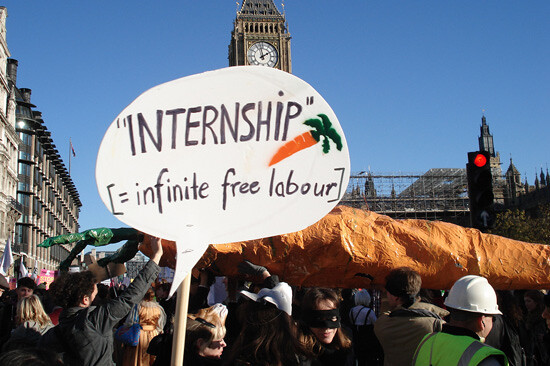

I. New Occupations…or Rehearsals for the Re-enchantment of Consequence
In the years preceding this moment, the common frustration of London’s critical art agents had been directed towards the total inefficacy of sophisticated so-called “radical” debates and projects staged inside cultural and education institutions. Always remaining confined within a space of critique without consequence, we had watched and even participated in the instrumentalization of our work. We had observed those capacities of art we hold dear being converted to models of cultural dissociation, imported and exported to and from an international art arena.
Working in the context of such deeply problematic institutions, and being so deeply inscribed within them, without a movement, our struggles were often isolated, disjointed, and unheard. Our individual (and often inaudible) protests of non-participation, attempts at critical occupancy, telephone rants, and negative reviews often seemed as alienated as the subjects of our critiques.
These divisions performed themselves in early September when members of the political art collective Chto Delat? came to London as part of the ICA’s “Season of Dissent.” They invited artists and activists to spend forty-eight hours in residence, working on a learning play about the very subject of how to intervene in the landscape of instrumentalized political art. Some members of London’s critical arts community refused to attend in protest against the ICA’s mass layoffs, mismanagement, and interpellation of critical artists into seemingly disingenuous (and uncompensated) attempts at institutional rebuilding in recent years.
For those who did take part, the play and process asked us to perform this division, to place ourselves on the side of “Art” or “Activism.” Though many felt this to be a reductive polarity, it was prescient in retrospect, as it demanded that we choose which political subject we imagined ourselves to be, what we were willing to risk, and what we desired. This made it a dress rehearsal for what was about to come: moments in which we would have to choose between going to work or going to the demonstration, between getting good grades or learning to collaborate, between supporting student demonstrators in the face of police attack or succumbing to vilifying media campaigns and university administrators who threatened punitive actions.
However, this rehearsal was small in comparison to the wave of art school and gallery occupations that took place in the weeks that followed, a few of which are outlined below in diary form.
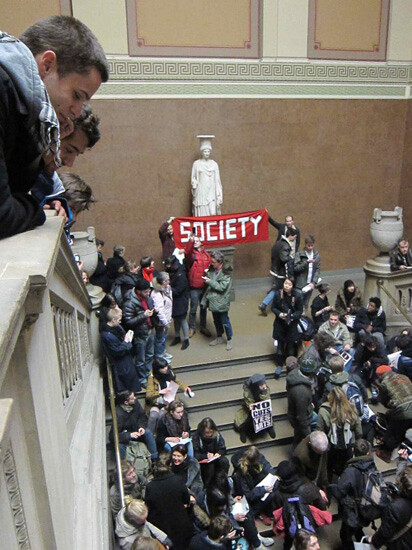

November 24, 2010
University College London, Occupation of Jeremy Bentham Room.
At the heart of many of the London occupations, the daily performances, outdoor life drawing classes, and banners that draped the UCL courtyard formed a meeting place in London for students, artists, and teachers. A timeline of the mobilizations in the central hall charted the work that had been done to date. In the main room tables were assembled with the titles “media,” “food,” and “legal.” Here, skills in dealing with legal issues, consensus decision-making, large-scale organization, and media liaising could be acquired. At a microphone in the front of the room, visitors from various social movements and student organizations announced themselves, expressed solidarity, and planned future actions.
December 2, 2010
Slade Student Occupation
Inspired by the success of UCL (just across the street), students at the Slade occupied a central room in the art college. After having anticipated a longer timeframe for participation, students were told that security on campus was to be increased, and quickly occupied a main building of the school.
December 6, 2010
Occupation Camberwell College of Art and Teach In: Turner Prize, Tate Britain.
Students took the upper main room at Camberwell’s Wilson St. building, staying throughout the Christmas holidays. Arts groups such as London’s Radical Education Forum and Ultra-red presented workshops at Camberwell as part of an open program. Food and support were brought by local groups in solidarity.
Over two-hundred students and lecturers from Goldsmiths, the Slade, St Martin’s, Camberwell, and other art and fashion colleges occupied Tate Britain during the live, televised presentations of the Turner Prize in a sit-in organized by the Arts Against Cuts Campaign. Corralled out of sight, away from official guests—the best and brightest of London’s art world—the students and artists protested: “We are not just here to fight fees! We are here to fight philistinism!” The chanting could be heard on the live television broadcast, drowning out the presenters’ words. Support was expressed by Turner Prize winners and some guests, with others treating the students’ protest as a performance for their own edification, describing the disruption as “naïve.”2
December 7, 2010
Goldsmiths Occupation and Royal College of Art Occupation
A coalition of students and lecturers occupied the university library at Goldsmiths in opposition to the cuts and subsequent increase in university fees. Opened as a center for organization, “available 24 hours a day to students and all those on the receiving end of the government’s assault in the local South London Lewisham community,” it was here that students made demands to the management at Goldsmiths, such as making a statement to oppose fees and refuse further cuts or staff redundancies at the university, and demanding that management defend all those from Goldsmiths arrested in protests and retract their threat to charge the Student Union £15,000 in response to the occupation of Deptford Town Hall.3 The occupation flared many tensions between staff and student participants, between generations and styles of activism, and between political agents from different movements, but it was also an important site for planning and for bringing students together in collective action.
In the name of education for all, support for student demonstrators, and a statement demanding an end to the cuts, students at The Royal College of Art occupied parts of the College, including its gallery, along with thirty-seven other colleges and universities in the country. Their letter of demands also addressed the teaching and learning conditions at the college. They requested access to the gallery, which rents for £4,500 per day, higher teacher-student ratios, and financial aid.
December 9, 2010
Teach-in at the National Gallery
On the day of the parliamentary vote to increase student fees, many student protesters found themselves kettled for hours. Meanwhile, arts students and lecturers staged a teach-in at Room 43 of London’s National Gallery. Their aim was to produce a manifesto for their portion of the education movement (read as a “nomadic hive”) that promoted tactics of swarming, avoiding kettles, and coming together for strategic actions. Staying beyond the closing hour, and holding the space until the task was completed, over two hundred artists and cultural workers contributed to the manifesto. In preparation, teachers using names from the history of art, such as Frida Kahlo, gave performative lectures about works of art on display nearby, including Manet’s Execution of Emperor Maximilian of Mexico (1868). While the manifesto was largely poetic, the task of coming together taught the group to make decisions, to better understand the potential of artists and the arts in a broader movement, and how to be in an institution on our own terms.
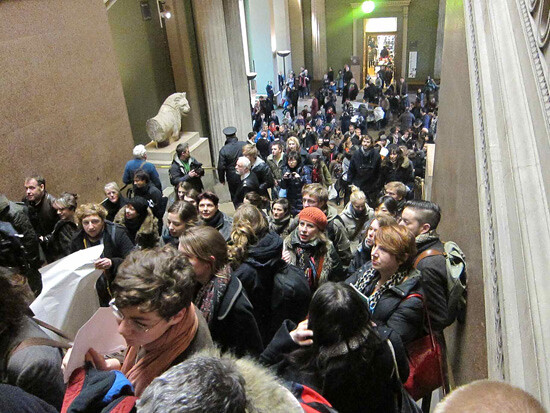

II. Reflection and Action: Long Weekends
Catalyzed by the excitement and organizing buzz of art departments and college occupations, two long weekends were arranged as opportunities for reflection, making, and planning. The first, December 5 and 6, 2010, was initiated by students at the Slade and hosted by the newly-formed Arts Against Cuts at Goldsmiths College. Its stated aim was to be “a furnace of creativity, a place to re-imagine resistance against the cuts [to] reclaim the public, critical space that universities and art schools should be.” This weekend also sought to
transform the buildings into a living laboratory, an art school for the future, which brings together art students, artists, cultural workers, and those fighting the cuts from across the UK to share in defiance against the relentless marketization of our education and our lives …. It’s not important what art is but what it does, and right now it has the potential to turn the crisis of cuts into an opportunity for change.4
The two weekends, the December Long Weekend at Goldsmiths and, more recently, the Direct Weekend at Camberwell College of Art, were first and foremost forums that made use of spaces in universities and art colleges. They built upon and developed the proliferation of groups, discussions, and affinities generated across departments, in museums and galleries, along all levels in the school system. Actions such as the Book Block and the gallery occupations came directly out of the discussions during the first Long Weekend. Importantly, so did the beginnings of a shared analytic framework. Primary topics of discussion included questions of composition—class, education, skill—and the constant challenge of keeping a movement open and connected to different struggles. The language of movement—how to express opposition to the cuts without producing a nostalgic glorification of what existed before—was an ongoing debate. How could students support teachers in their protest for better wages while supporting each other in challenging the ways schools are run? We debated unions, how to defend a public sector from the multiple positions of cultural practitioners and educators, artists and freelancers, students and teachers—all of whom are precarious, part-time, and disaffiliated from institutions of public culture and education.
Beyond the slightly declamatory language of art manifestos, what emerged was a search for a collective time-space in which the critique of existing cultural and educational institutions could be articulated, but could also form the basis for learning and organizing towards concrete alternatives. Stemming from a shared sensitivity to practices of collective production and thought, experiments settled into the discomfort of finding forms that do not replicate the art world with its authorial and spectatorial regimes: the lecturers lecturing and the students studying; the artists making art while the rest of the world observes; the poster and the performance quickly crystallizing into an authored commodity.
The recognition of these often unspoken issues and tensions within critical cultural production around authority prompted a rapid process of self-education. Together students, teachers, and artists learned strategies of horizontal decision-making and facilitation—bearing the fruits of years of experiments and discussions around anti-authorial and autonomous forms of artistic action in the art world—we patiently nibbled away at habitual polarizations between art and politics.
Tensions and new skills were developed between different forms of organization—consensus versus voting, lectures versus group work—but also between the voices of teachers and students, between those with a lot of organizing experience and those with none at all. Teachers and students together found ways to move away from authoritative forms to act with hundreds of people, made plenaries, opened spaces, and learned to move from idea to action. These lessons were perhaps the most formative. Different from the spaces of the main student assemblies, these were zones of micropolitical learning.
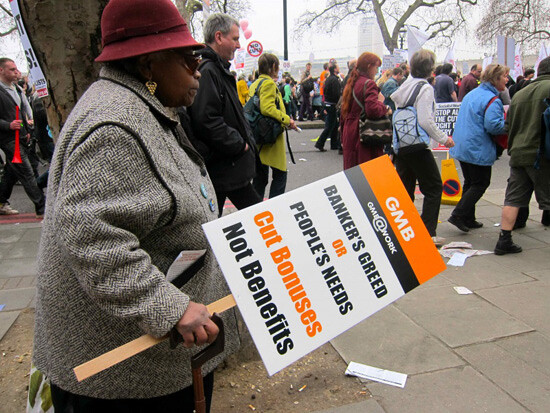

III. Docile Bodies and Police Violence: the Pedagogy of the Kettle
We continued learning the organizational forms of a movement, albeit much more rapidly in the days of the protests and demonstrations. Beyond the ambiguous messages of the spectacularization of occupations and street demos—“making good TV”—the Millbank event marked for many of us the beginning of an embodied crash course in contemporary biopolitics. If critical cultural workers and art students had bathed for more than a decade in Foucauldian analysis and terminologies, now was the moment to wear the theory in practice, to feel it on the collective body of the movement, and on the individual bodies of its participants. The first kettle was unexpected for most, except for the few of us who had experienced the G8 demonstrations around the world in the early 2000s. Critical teachers had brought their students, freelance practitioners had invited friends and collaborators, and all found themselves immersed in a joyful swarm of fifteen- and sixteen-year-olds walking out in rage against the fee increases. At one point in the day, we were suddenly blocked, surrounded, and violently held for ten hours in freezing temperatures, with no explanation given, no dialogue possible, no water, no food, and no toilets. Agamben’s state of exception suddenly translated from some seminar room debate to the here and now, in the shadow of the so-called democratic Houses of Parliament in central London.
The body in these moments became the meeting place for abstract notions of state violence, for various knowledges of performance art, agitprop, and situationism: gesture and voice surfaced and combined to bring about new levels of awareness and understanding that was far more than skin-deep. “There is knowledge,” as one demonstrator said, “and there is knowledge.” We came to know differently in the kettle that the police exist to protect private property, and no matter how harmless and docile we are, they will contain us and shout at us, shove us around, and hold us still in uncomfortable positions. Our initial bewilderment and liberal rationalizations—“they’ll let us free once they realize there’s been a mistake”—became passive resignation and quickly grew into a pensive anger, whose embers are kept alive in recounting the stories to our bewildered and unsympathetic friends alike.
In all its painful and futile violence, the event of the kettle became, out of necessity, a space of political self-education for those among us who had inhabited a more detached version of cultural politics, of gentle dissent and civilized debate. These experiences contradicted the inculcated belief—certainly the by-product of the education we are so proud of—that state instruments of repression are only used against those who misbehave. Those of us who thought we had a “right” to peaceful protest were spectacularly reminded that this right had been bestowed upon us by a high authority that can withdraw it at will and with the least credible excuses, if any excuses were even to be bothered with at all. At the same time, we also relearned the performative dimensions of these rights and remembered that the making of a space of dissent is a composition of gestures, not a procedurally granted abstraction.
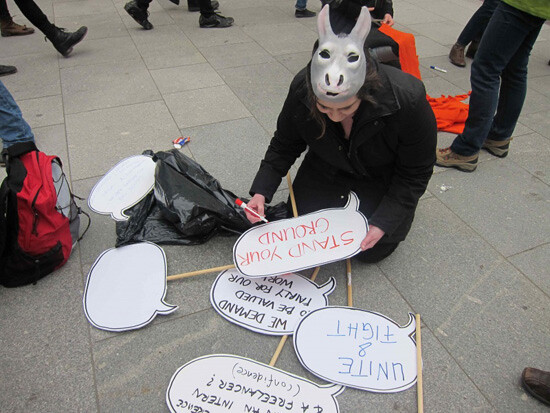

In being there, being kettled and breaking out of it, our bodies understood the dynamic relationship between power over and power to, the latter found in our actions together inside this space, in our collective memory of physical oppression, the sharing of stories and reflections. In affinity groups, we rediscovered the importance of our critical and artistic education in giving us the tools to deconstruct and de-legitimize supposedly “legitimate” use of “reasonable force”: to realize, narrate, and understand collectively that violence is structural and had always been there, and that violence has now simply revealed itself to a larger swathe of society who found themselves suddenly and quite unexpectedly on the frontline of a conflict for a right as basic as public education. Avoiding and breaking out of the kettle, we learned the value of free movement—that space is created through action, and that swarming the city in small groups of joyful spontaneous running is one with shouting “Whose streets? Our streets!” Situationism was no longer an art historical movement or a feeble attempt at re-enactment but a necessary practice.
As students and educators we also used the kettle to reflect on questions of politics and responsibility. And after the kettle we learned again. We learned about the images within and the images outside: the way the helicopter light shined down on us in the dark without really illuminating anything, the absurdity of police choreography, the hours of waiting in line to get out, of warming our hands by the fires fueled with burning placards—all of which were reduced to one image in the mainstream press. This reminded us of the power of spectacle, a practical training in media literacy that we will not forget.
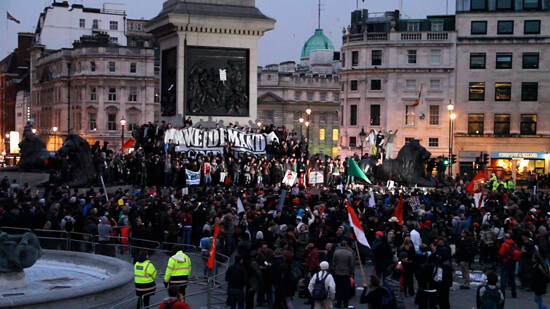

IV. Some Questions to Take Forward
At the end of these intense weeks, we are left with affects and questions, with a fundamental intensification of collective ties, and a deep interrogation of our existing, conflictual positions within and beyond the institutions we inhabit. We assess now how far we are willing to go.
Our sense of belonging is shifting and growing at the same time as our institutions are becoming increasingly hard to work within. How can collectivity be strengthened in the coming weeks and months? How can it not be overcome by legal and administrative controls in the reduced versions of the places where we work and go to school?
How can these recent events inform the micro-practices of groups, as a more sustainable mode of struggle that goes beyond the state of emergency status of these weeks? With these experiences in hand, how do we begin to set up the world we want to be in?
How do we maintain the momentum of event-togetherness-excitement in all of our practices? How do we make this the reality in which we live in at a more elongated pace?
How do we engage with the media? What are the other ways of increasing our numbers and moving public opinion into direct forms of action?
Regardless of how these questions are to be resolved, we are noticing how nice our bodies feel after these weeks, having been away from our routines and the computer, from the mute sites of our work. It becomes even clearer that this “work”—whether that of the teacher, student, or artist—is not all there is to fight for. The world we create will make that alienating rhetoric of “work” void, it will stop work from dividing us. Instead, our self-organization shows what pleasures lie in messing with the divisions of labor and life in the context of struggle. Occupations and demonstrations have been laboratories of such un-division, of joyful collaboration, of a conviviality that has something more in mind than a career, the next job, a house, and a car. Up and down stairs, off to meetings in unfamiliar places, carrying cookies and teabags, exploring our vocal range, gazing at strangers, designing last-minute placards, turning lecture halls into spaces where life and learning finally overlap again, learning to perform in protest. A collective becoming is never based on a fixed identity, on a set plan, or on a few steps—it happens because our potentials resonate with our givens, because we enjoy and grow. We work to keep this resonant, growing, spreading, building, fun; that’s the “work” we like. We’ll stay with it: moving, sensing, fighting, dancing.
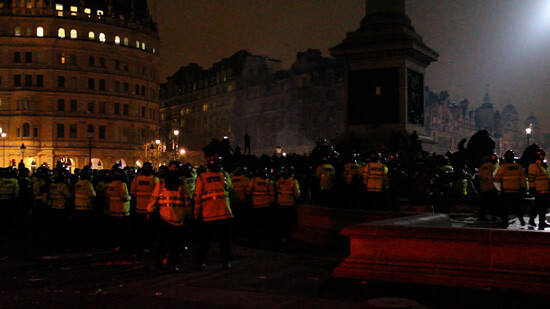

This is the original English version of a text commissioned for a special issue of Paletten, guest-edited by Maria Lind.
Precarious Workers Brigade have policy of including information on the context in which their work appears. Written March–April 2011; by 9 people of PWB; published in e-flux journal and Are You Working Too Much? Post-Fordism, Precarity, and the Labor of Art, published by Sternberg Press; text online available for free, book costs €12; writer fee total $750; fee spent by PWB on collective investment; e-flux journal employed 2 interns in 2010; 2 interns collaborated in preparing this text for publication; they are paid at $0 per hour. This text is licensed under a Creative Commons non-commercial, share alike, accreditation license BY-NC-SA 3.0. See →.
